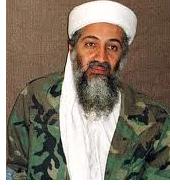Legal justifications
What was the legal basis for the Bin Laden strike?
 The killing of al-Qaeda leader Osama bin Laden is engaging some of the thorniest questions of the United States' post-Sept. 11 campaign against terrorism, including the government's legal justification for carrying out the targeted killing of suspected terrorists.
The killing of al-Qaeda leader Osama bin Laden is engaging some of the thorniest questions of the United States' post-Sept. 11 campaign against terrorism, including the government's legal justification for carrying out the targeted killing of suspected terrorists.
Lawyers who specialize in national security said today that the US had several possible legal justifications for carrying out Sunday's strike. But the operation in Abbottabad, Pakistan, raises other issues, too.
John Bellinger III, who served as the State Department's top lawyer during President George W. Bush's second term, said the strike was on solid legal footing. Under domestic law, Bellinger said the strike falls in the "sweet spot" of the 2001 congressional authorization for the use of military force against al-Qaeda. Under international law, he said it's justified by the United States' right to defend itself and because of the ongoing armed conflict with al-Qaeda.
Bellinger, a partner at Arnold & Porter, wondered whether the Obama administration would nevertheless receive criticism about its use of force.
"The Bush administration was roundly criticized for this idea of a global conflict, as has been the Obama administration to a lesser extent," he said, "so it will be interesting to see whether [human rights activists] claim this was an illegal use of force against bin Laden in Pakistan."
Other national security lawyers agreed with the idea that bin Laden's killing had a firm legal justification.
"The administration using the power it has under the [2001 authorization] and under the Constitution could properly justify this action as a legitimate act of self-defense," said John Radsan, a professor at William Mitchell College of Law who was an assistant general counsel at the Central Intelligence Agency from 2002 to 2004.
Even though Sunday's attack took place on Pakistani soil without that nation's prior consent, the Pakistani government has generally gone along with other U.S. operations. And a 1976 executive order that bans assassinations doesn't apply here, the lawyers said, because the US is at war with al-Qaeda.
The 1976 order refers to "the kind of assassinations that the CIA attempted in '60s and '70s," said Jeffrey Smith, an Arnold & Porter partner who was CIA general counsel in the mid-1990s. "Here, it's fundamentally different. Here, Osama led a non-state actor group that had openly directed attacks against the United States."
The death of bin Laden could mean a mental shift for many in government, including those in the U.S. Justice Department. Paul McNulty, who was U.S. attorney for the Eastern District of Virginia during the trial of convicted Sept. 11 conspirator Zacarias Moussaoui, said that during each terrorism case he worked on, "the question was always, will this case or the next case help us make some headway" in catching bin Laden.
McNulty, now a partner at Baker & McKenzie, also served as deputy attorney general under Bush and said he went to countless meetings that touched on bin Laden's activities. "It was always there in the back of our minds, and in some meetings it was very much the dominant subject," said McNulty.
George Terwilliger III, another former deputy attorney general, said he was struck by reports that information from a Guantánamo Bay detainee helped U.S. officials to identify one of bin Laden's couriers — a development that could renew debate over closing the military prison there.
"That demonstrates why it's important to have a facility like that, to engage in sensible, aggressive interview techniques and other methods of intelligence-gathering from human sources," said Terwilliger, a White & Case partner.
Benjamin Powell, who served under Bush as general counsel of the Office of the Director of National Intelligence, echoed that argument. The strike "highlights the continuing issue of, do we have a legal framework for bringing people into custody and obtaining information from them?" said Powell, a partner at Wilmer Cutler Pickering Hale and Dorr.
(Published by BLT - May 2, 2011)